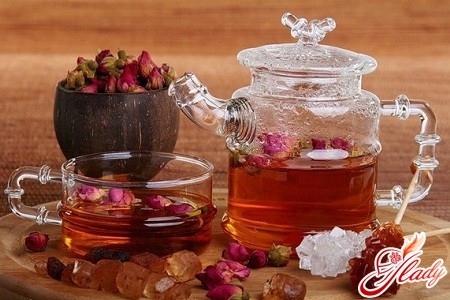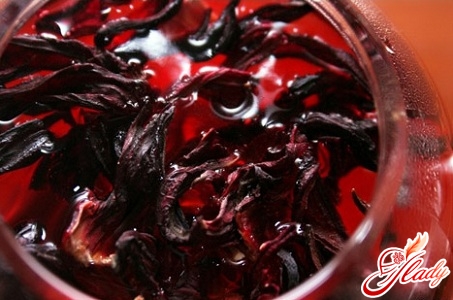 Hibiscus tea can be called tea conditionally, becauseit is made not from the leaves of the tea bush, but from the inflorescences of hibiscus, or Sudanese rose. According to its botanical status, this plant belongs to the mallow family, it is cultivated in many African and Asian countries - Egypt, Sudan, India, China, Ceylon, Java, Sri Lanka, Thailand. In Egypt, hibiscus is considered a national drink - here it is drunk both hot and cold. Hibiscus tea perfectly quenches thirst in hot climates and is very useful for our body. Actually, the benefits of hibiscus tea are the topic of our article.
Hibiscus tea can be called tea conditionally, becauseit is made not from the leaves of the tea bush, but from the inflorescences of hibiscus, or Sudanese rose. According to its botanical status, this plant belongs to the mallow family, it is cultivated in many African and Asian countries - Egypt, Sudan, India, China, Ceylon, Java, Sri Lanka, Thailand. In Egypt, hibiscus is considered a national drink - here it is drunk both hot and cold. Hibiscus tea perfectly quenches thirst in hot climates and is very useful for our body. Actually, the benefits of hibiscus tea are the topic of our article.
About the benefits of carcade tea
Hibiscus tea contains vitamins, amino acids,antioxidants, easily digestible carbohydrates and polysaccharides, including pectin. This composition helps cleanse the body, remove toxins and even heavy metal salts. In countries where Sudanese rose is grown, hibiscus tea is used in folk medicine as a means of regulating blood pressure. It is believed that hot tea increases blood pressure, and cold tea decreases it. Some experts express an alternative point of view - hibiscus tea regulates (this is the key word) blood pressure. The anthocyanins contained in the drink (thanks to them, the tea has such a rich red color) strengthen blood vessels. That is why hibiscus is recommended for varicose veins and other vascular diseases. Linoleic acid, which is found in the inflorescences, normalizes the lipid composition and reduces the level of so-called bad cholesterol, which causes irreparable harm to our blood vessels. Hibiscus tea is ideal for people who have suffered a stroke or heart attack. The benefit of the drink is also due to the action of the flavonoids it contains, which help cleanse the body of metabolic products. Thanks to them, bile production is enhanced, the liver is protected, and metabolism is improved. In addition, hibiscus tea has a deadly effect on some microorganisms, is used as an anthelmintic, and is beneficial for elevated temperatures. It is recommended for use in tonsillitis and sore throats, as the tea has a pronounced anti-inflammatory effect. The beautiful half of humanity will undoubtedly appreciate such a quality of hibiscus as its ability to influence weight loss due to the diuretic effect and improved metabolism. The benefits of hibiscus tea are not limited to the properties listed above. Unlike many drinks with a sour taste, it does not contain oxalic acid, which is harmful to people with diseases of the gastrointestinal tract, kidneys, and those who suffer from gout. To sum up, we can say that hibiscus tea can be recommended to almost everyone as a multivitamin drink that contains the necessary substances in proportions beneficial to the human body. And one more thing. You should not throw away the inflorescences after brewing, you can simply chew them, add them to salads, as they contain useful proteins and amino acids, including essential ones. Can hibiscus tea be harmful? There are no contraindications to drinking hibiscus tea for healthy people. Of course, if you drink it in reasonable quantities. Abuse of even a healthy drink will harm your health. Hibiscus is not recommended for people with gastritis and stomach ulcers.
How to prepare a carcade tea
There are several ways to prepare this drink. Knowing them, you will not harm your health.
- Experts for whom karkade tea isnational drink, believe that before brewing the petals of the Sudanese rose should be soaked for a few hours in cold water. In this there is reason, because in this way we do not just prepare the raw material for brewing, but also perfectly wash it.
- The following important rule: for brewing use only glass or china. Tea, brewed in a metal vessel, can damage firstly, and secondly, it loses its taste.
- Wet inflorescences pour boiling water and insist for 5 minutes.
- Frozen inflorescences put in heat-resistantglass or porcelain dishes, pour boiling water and boil for 5 minutes. Do not overexpose, otherwise tea will lose its bright, rich color and many useful qualities.
To prepare a cold drink, hibiscus teabrewed in any of the above ways, cooled and served with ice. If desired, you can add a small amount of sugar to the tea to make its taste softer. The drink from the Sudanese rose will only bring benefits, not harm, if you follow the simple rules for its preparation that we have familiarized you with. We recommend reading:









